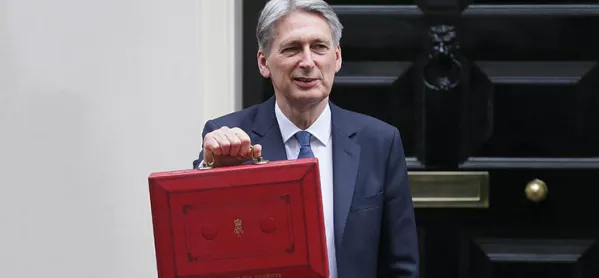The chancellor’s Budget was “deeply disappointing” for further education funding, politicians and sector leaders have said.
Despite the Love Our Colleges and Raise the Rate campaigns calling for an increase in FE funding, the only substantial new announcement in the speech by Philip Hammond was a cut in apprenticeship contributions for small employers.
The Budget document only contained a number of announcements that had been made previously.
Shadow FE minister Gordon Marsden, who had been calling for an increase in funding for colleges, said: “It is deeply disappointing that the chancellor has once again refused to give our further education sector the funding it needs.
“Spending on further and adult education has already fallen by £3.3 billion in real terms, and today's budget has made it clear that the prime minister's promise to end austerity will not extend to colleges.
"Labour will genuinely end austerity in further education by increasing investment, reintroducing the Education Maintenance Allowance and scrapping advanced learner loans to make it free at the point of use to all those who need it."
Budget 2018: 'A missed opportunity'
University and College Union head of policy and campaigns Matt Waddup said: “Today’s budget is yet another missed opportunity to properly address the urgent financial challenges facing our education system. While the chancellor spoke of the importance of skills for our economy, instead of investing properly in further education he has kicked the pressing issue of college pay and funding into the long grass of next year’s spending review.” Earlier today, the union announced it would be reballoting some branches on its plans for a strike over pay.
James Kewin, deputy chief executive of the Sixth Form Colleges Association, said: “The chancellor has once again missed the opportunity to provide schools and colleges with the funding they need to continue delivering the high-quality, internationally competitive education our young people deserve. It is even unclear if the £400 million the chancellor has set aside for ‘extra bits of kit’ in schools will be available to colleges.
“What is clear is that the government has found £420m to fix potholes this year, but no new money to increase core funding for the education of 16- to 18-year-olds. Along with our partners in the Raise the Rate campaign, we will continue to press the government to increase the funding rate for sixth-form students in next year’s spending review.”
Skills: what the Budget says
- Up to £450m available to enable levy-paying employers to transfer up to 25 per cent of their funds to pay for apprenticeship training in their supply chains.
- The co-investment rate for apprenticeship training for small businesses will be halved.
- Up to £5m to the Institute for Apprenticeships and National Apprenticeship Service in 2019-20, “to identify gaps in the training-provider market and increase the number of employer-designed apprenticeship standards available to employers”.
- £100m for the first phase of the National Retraining Scheme.
- The government will fund £20m of skills pilots. This will include: a £3m pilot “to help employers in Greater Manchester and surrounding areas to address local digital skills gaps through short training courses”; a £10m pilot in Greater Manchester, working with the Federation of Small Businesses, to “test what forms of government support are most effective in increasing training levels for the self-employed”; and £7m match-funding alongside employers to provide on-the-job training to young people not currently in employment, education or training in Greater Manchester.
- £38m of capital funding to support implementation of the first three T levels in 2020.




